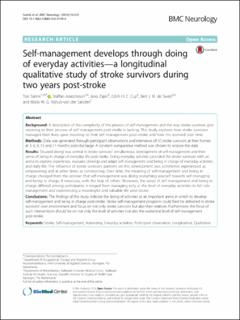| dc.contributor.author | Satink, Ton | |
| dc.contributor.author | Josephsson, Benkt Staffan | |
| dc.contributor.author | Zajec, Jana | |
| dc.contributor.author | Cup, Edith HC | |
| dc.contributor.author | de Swart, Bert JM | |
| dc.contributor.author | Nijhuis-van der Sanden, Maria W. G. | |
| dc.date.accessioned | 2020-04-20T08:16:36Z | |
| dc.date.available | 2020-04-20T08:16:36Z | |
| dc.date.created | 2017-01-18T11:45:53Z | |
| dc.date.issued | 2016 | |
| dc.identifier.citation | BMC Neurology. 2016, 16 | en_US |
| dc.identifier.issn | 1471-2377 | |
| dc.identifier.uri | https://hdl.handle.net/11250/2651622 | |
| dc.description.abstract | Background
A description of the complexity of the process of self-management and the way stroke survivors give meaning to their process of self-management post-stroke is lacking. This study explores how stroke survivors managed their lives, gave meaning to their self-management post-stroke and how this evolved over time.
Methods
Data was generated through participant observations and interviews of 10 stroke survivors at their homes at 3, 6, 9, 15 and 21 months post-discharge. A constant comparative method was chosen to analyse the data.
Results
‘Situated doing’ was central in stroke survivors’ simultaneous development of self-management and their sense of being in charge of everyday life post-stroke. Doing everyday activities provided the stroke survivors with an arena to explore, experience, evaluate, develop and adapt self-management and being in charge of everyday activities and daily life. The influence of stroke survivors’ partners on this development was sometimes experienced as empowering and at other times as constraining. Over time, the meaning of self-management and being in charge changed from the opinion that self-management was doing everything yourself towards self-managing and being in charge, if necessary, with the help of others. Moreover, the sense of self-management and being in charge differed among participants: it ranged from managing only at the level of everyday activities to full role management and experiencing a meaningful and valuable life post-stroke.
Conclusions
The findings of this study indicate the doing of activities as an important arena in which to develop self-management and being in charge post-stroke. Stroke self-management programs could best be delivered in stroke survivors’ own environment and focus on not only stroke survivors but also their relatives. Furthermore, the focus of such interventions should be on not only the level of activities but also the existential level of self-management post-stroke. | en_US |
| dc.language.iso | eng | en_US |
| dc.publisher | BioMed Central | en_US |
| dc.rights | Navngivelse 4.0 Internasjonal | * |
| dc.rights.uri | http://creativecommons.org/licenses/by/4.0/deed.no | * |
| dc.title | Self-management develops through doing of everyday activities - a longitudinal qualitative study of stroke survivors during two years post-stroke | en_US |
| dc.type | Peer reviewed | en_US |
| dc.type | Journal article | en_US |
| dc.description.version | publishedVersion | en_US |
| dc.source.volume | 16 | en_US |
| dc.source.journal | BMC Neurology | en_US |
| dc.identifier.doi | 10.1186/s12883-016-0739-4 | |
| dc.identifier.cristin | 1430667 | |
| dc.description.localcode | Open Access This article is distributed under the terms of the Creative Commons Attribution 4.0 International License (http://creativecommons.org/licenses/by/4.0/), which permits unrestricted use, distribution, and reproduction in any medium, provided you give appropriate credit to the original author(s) and the source, provide a link to the Creative Commons license, and indicate if changes were made. The Creative Commons Public Domain Dedication waiver (http://creativecommons.org/publicdomain/zero/1.0/) applies to the data made available in this article, unless otherwise stated. | en_US |
| cristin.ispublished | true | |
| cristin.fulltext | original | |
| cristin.qualitycode | 1 | |

